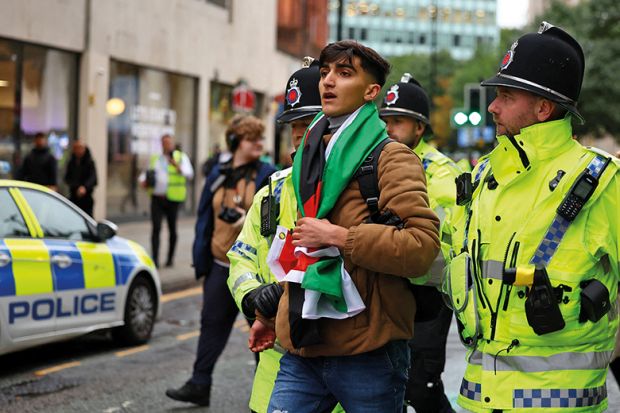UK academics who specialise in the Middle East have claimed that debate about the current situation in Israel and Gaza is being stifled because of an “atmosphere of fear” fostered by cancellations, threats and government rhetoric.
Since deadly violence flared on 7 October, scholars said events have been called off, students suspended and academics subjected to death threats online, with universities accused of not doing enough to protect free speech and academic freedom.
Jewish groups have also warned that intimidation and harassment on campuses – including some open support for the killing of 1,400 Israelis by Hamas – was forcing students to hide their identities.
More than 3,000 Palestinians have since been killed in retaliatory strikes by Israel, and a statement released by the British Society for Middle Eastern Studies (Brismes) said students and academics trying to raise awareness about the situation in Gaza “have been subject to threatening responses…and in some cases were confronted with disciplinary or even legal action”.
This “sudden restriction of free speech…and the atmosphere of fear and suspicion has reduced the space to discuss the history and context of one of the longest ongoing conflicts”, it added.
Lewis Turner, lecturer in international politics at Newcastle University and a member of the Brismes academic freedom committee, said this has created “incredibly difficult circumstances” for the individuals involved but was also “dramatically ramping up a chilling effect” that was already preventing “open and free conversations about Palestine” in universities.
“It is very difficult for people to organise events, speak out, use their expertise to comment on the situation or use widely accepted scholarly terms and language in public debate,” he said.
After the war began, Liverpool Hope University cancelled a planned lecture on Israel by University of Oxford historian Avi Shlaim because of concerns about the “well-being and safety” of its students. The Palestine Society at SOAS University of London has also alleged that the institution has suspended students who attended a rally in support of Gaza. SOAS reportedly said the suspensions were due to the conduct of some attending the rally, not because of the cause.
Meanwhile, the Union of Jewish Students (UJS) has reported more than 150 calls to its dedicated hotline reporting incidents of verbal abuse, intimidation and the targeting of Jewish students’ accommodation. In one incident, a WhatsApp group used by a Jewish society was infiltrated and bombarded with antisemitic threats.
Education ministers Gillian Keegan and Robert Halfon wrote to vice-chancellors to urge them to act on antisemitism and the “glorification of terrorism”.
“We urge universities to take this message seriously by unequivocally supporting their Jewish students and expressing a zero-tolerance policy for those who support terror,” a UJS spokesman said.
Campus resource: A DIY guide to protecting academic freedom
But Dr Turner said this statement and others made by ministers had conflated support for Palestine and support for violence, and its assertions that universities should report staff and students to the Prevent scheme were adding to fears about saying anything about the conflict, particularly for marginalised scholars who have felt racially targeted in the past.
“It is becoming much more difficult and much riskier for scholars to share their expertise, which is needed now more than ever,” Dr Turner said.
“It seems very clear that ostensible commitment to free speech and academic freedom in universities appears very selective in a way that aligns with overarching government policy and views.”
Miriyam Aouragh, a University of Westminster professor and vice-chair of the University and College Union’s black members’ standing committee, described being inundated with requests for help from academics facing repercussions for their work on the Middle East.
“People are emotional, scared; they are being asked to meet managers or heads of schools and don’t know how to respond,” she said.
“For years we’ve been told in this supposed ‘war against woke’ that it is a fundamental feature of a healthy society to have the space to agree and disagree within respectful boundaries and without inciting violence or hatred.
“This fundamental basic principle is being tested now, and it seems the commitment to academic freedom has evaporated.”
Register to continue
Why register?
- Registration is free and only takes a moment
- Once registered, you can read 3 articles a month
- Sign up for our newsletter
Subscribe
Or subscribe for unlimited access to:
- Unlimited access to news, views, insights & reviews
- Digital editions
- Digital access to THE’s university and college rankings analysis
Already registered or a current subscriber? Login








